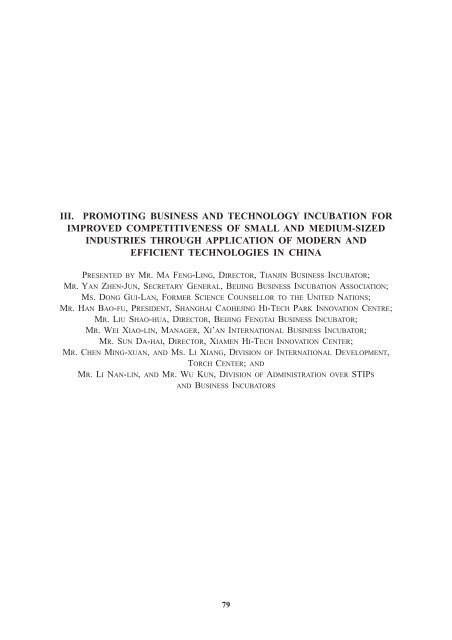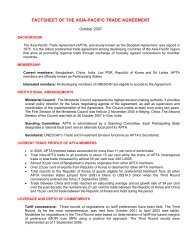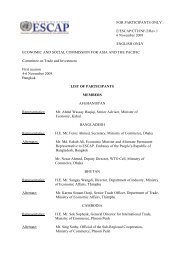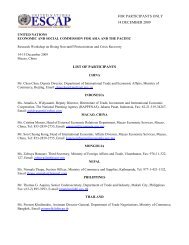iii. promoting business and technology incubation for ... - Escap
iii. promoting business and technology incubation for ... - Escap
iii. promoting business and technology incubation for ... - Escap
You also want an ePaper? Increase the reach of your titles
YUMPU automatically turns print PDFs into web optimized ePapers that Google loves.
III. PROMOTING BUSINESS AND TECHNOLOGY INCUBATION FOR<br />
IMPROVED COMPETITIVENESS OF SMALL AND MEDIUM-SIZED<br />
INDUSTRIES THROUGH APPLICATION OF MODERN AND<br />
EFFICIENT TECHNOLOGIES IN CHINA<br />
PRESENTED BY MR. MA FENG-LING, DIRECTOR, TIANJIN BUSINESS INCUBATOR;<br />
MR. YAN ZHEN-JUN, SECRETARY GENERAL, BEIJING BUSINESS INCUBATION ASSOCIATION;<br />
MS. DONG GUI-LAN, FORMER SCIENCE COUNSELLOR TO THE UNITED NATIONS;<br />
MR. HAN BAO-FU, PRESIDENT, SHANGHAI CAOHEJING HI-TECH PARK INNOVATION CENTRE;<br />
MR. LIU SHAO-HUA, DIRECTOR, BEIJING FENGTAI BUSINESS INCUBATOR;<br />
MR. WEI XIAO-LIN, MANAGER, XI’AN INTERNATIONAL BUSINESS INCUBATOR;<br />
MR. SUN DA-HAI, DIRECTOR, XIAMEN HI-TECH INNOVATION CENTER;<br />
MR. CHEN MING-XUAN, AND MS. LI XIANG, DIVISION OF INTERNATIONAL DEVELOPMENT,<br />
TORCH CENTER; AND<br />
MR. LI NAN-LIN, AND MR. WU KUN, DIVISION OF ADMINISTRATION OVER STIPS<br />
AND BUSINESS INCUBATORS<br />
79
A. Review of the new China’s development in economy <strong>and</strong> <strong>technology</strong><br />
1. Economic development of the new China<br />
China founded after the World War II was a poor <strong>and</strong> backward agricultural country. From 1949 to 1977,<br />
under the system of centralized planning entirely by the Central Government, the national economy experienced<br />
a period of recovery, a period of the high tide of large-scale construction, a period of adjustment <strong>and</strong> a period of<br />
slow development in the ten years of the Great Cultural Revolution. Because of the poor foundation <strong>and</strong> the<br />
restriction of the planned economy system, China’s economy was always at a state of backwardness. Especially<br />
<strong>for</strong> the influence of the Great Cultural Revolution, China’s economy was at the brink of collapse.<br />
China’s pursuance of re<strong>for</strong>m <strong>and</strong> opening up policy from the end of the 1970s <strong>and</strong> her gradual transition<br />
from the socialist planned economy to the socialist market economy with Chinese characteristics have put the<br />
national economy on a track of continuous rapid <strong>and</strong> healthy development. The annual average growth rate of<br />
China’s GDP was 9.3 per cent, which was three times of the average growth rate of the whole world economy,<br />
two times of the average growth rate of the developing countries <strong>and</strong> four times of the developed countries<br />
in the same period. According to the report of the World Bank, China’s GDP leaped to the 7 th place in<br />
the world in 1997, thereby becoming an important <strong>for</strong>ce in the world economy. In 2001, China’s GDP was up to<br />
Y 9,593.3 billion (US$ 1,200 billion). China’s economy has been greatly strengthened; the Chinese people are<br />
becoming better off; <strong>and</strong> the supply of commodities has been in abundance. In 2001, the amount of <strong>for</strong>eign<br />
investment absorbed by China was US$ 46.8 billion, up by 14.9 per cent; the international payments were<br />
balanced; the year-end national <strong>for</strong>eign exchange reserve was US$ 212.2 billion, up by US$ 46.6 billion from the<br />
end of the preceding year; <strong>and</strong> the consumption level of individual residents raised by 0.7 per cent 1 . China’s<br />
economy has been integrated in the world economic development. China today is surprising the world with the<br />
great scale <strong>and</strong> high speed of her change <strong>and</strong> the vigour <strong>and</strong> vitality of her growth.<br />
2. Review of New China’s science <strong>and</strong> <strong>technology</strong> development<br />
Under the planned system, S&T <strong>and</strong> industry were separated from each other, many R&D achievements<br />
were only samples, gifts, <strong>and</strong> items on display. Since the pursuance of re<strong>for</strong>m <strong>and</strong> opening up to the outside<br />
world, the Government of China has resolutely insisted on the strategy of “relying on science <strong>and</strong> education to<br />
rejuvenate the nation”, which has made China’s science <strong>and</strong> <strong>technology</strong> enter a period of rapid development. In<br />
1978, China held a national science conference; in 1988, Deng Xiaoping advanced the idea “science <strong>and</strong> <strong>technology</strong><br />
are the primary productive <strong>for</strong>ce”; in 1985, China implemented system re<strong>for</strong>m in science <strong>and</strong> <strong>technology</strong> <strong>and</strong><br />
<strong>for</strong>mulated <strong>and</strong> followed the policy that “science <strong>and</strong> <strong>technology</strong> must be relied on <strong>for</strong> economic development<br />
<strong>and</strong> science <strong>and</strong> <strong>technology</strong> must be oriented to economic development”. The most essential purpose of the<br />
policy is to rapidly <strong>and</strong> extensively apply science <strong>and</strong> <strong>technology</strong> achievements to industrial production, give full<br />
play to the role of scientific <strong>and</strong> technological personnel, <strong>and</strong> greatly liberate the productive <strong>for</strong>ce of science <strong>and</strong><br />
<strong>technology</strong> so as to facilitate the growth of economy <strong>and</strong> progress in society. The Government of China has<br />
unceasingly propelled R&D institutes, educational institutions <strong>and</strong> production units to cooperate to <strong>for</strong>m<br />
a mechanism of synergy that integrate scientific research, design, production <strong>and</strong> service <strong>for</strong> trans<strong>for</strong>mation of<br />
science <strong>and</strong> <strong>technology</strong> towards direct productive <strong>for</strong>ce. The said policy has strengthened independent development<br />
capacity towards the economic construction, market <strong>and</strong> society of scientific research institutions, especially<br />
technological development institutions, <strong>and</strong> strengthened the linkage between <strong>technology</strong> <strong>and</strong> economy. A large<br />
group of new-type high-tech enterprises have spun off from scientific <strong>and</strong> technological institutions <strong>and</strong> become<br />
an important <strong>for</strong>ce <strong>and</strong> a new source of economic growth in China’s development of the high-tech industry. The<br />
situation of unreasonable distribution of talents <strong>and</strong> waste of human resources has been changed to a great extent.<br />
A lot of scientific <strong>and</strong> technological personnel have left their ivory tower <strong>and</strong> begun operating enterprises through<br />
way of contracting or leasing. Participating in fierce market competition, they have become technological<br />
entrepreneurs who not only have scientific <strong>and</strong> technological knowledge but also are proficient in management.<br />
From rice gene database, human genome programme <strong>and</strong> functional genome research in basic research to<br />
important industrial achievements with proprietary intellectual property rights (e.g., integrated computer <strong>technology</strong>,<br />
1 China, Government Work Report <strong>for</strong> the National People’s Congress, 2002.<br />
81
communication <strong>technology</strong>, network <strong>technology</strong>, microelectronics <strong>technology</strong> <strong>and</strong> cryptographic <strong>technology</strong>), many<br />
great achievements have been made in the development of science <strong>and</strong> <strong>technology</strong>. The development of science<br />
<strong>and</strong> <strong>technology</strong> has given momentum to China’s economic development <strong>and</strong> become an inexhaustible driving<br />
<strong>for</strong>ce <strong>for</strong> the progress of the nation.<br />
B. The launch <strong>and</strong> development of <strong>technology</strong> <strong>business</strong> incubators 2<br />
The Government of China has implemented the Torch Program <strong>and</strong> identified science <strong>and</strong> <strong>technology</strong><br />
industrial parks (hereinafter referred to as STIPs) <strong>and</strong> <strong>technology</strong> <strong>business</strong> incubators as means to industrialize<br />
<strong>technology</strong> <strong>and</strong> to enhance the competitiveness of small <strong>and</strong> medium-sized enterprises.<br />
1. Implementation of the Torch Program<br />
Approved by the State Council in August 1988 <strong>and</strong> implemented by the Ministry of Science <strong>and</strong> Technology<br />
(MOST), the Torch Program is a guiding programme <strong>for</strong> the development of China’s high <strong>and</strong> new <strong>technology</strong><br />
industry. The core mission of the Torch Program is to give scope to the advantages <strong>and</strong> potentials of China’s<br />
scientific <strong>and</strong> technological <strong>for</strong>ces <strong>and</strong> accelerate commercialization of high <strong>and</strong> new <strong>technology</strong> achievements,<br />
industrialization of high <strong>and</strong> new <strong>technology</strong> products <strong>and</strong> internationalization of the high <strong>and</strong> new <strong>technology</strong><br />
industry with market as the orientation. The focus of the Torch Program is to create an environment favourable<br />
<strong>for</strong> the development of high <strong>and</strong> new <strong>technology</strong> industry, which include such initiatives as <strong>for</strong>mulation of related<br />
policies, laws <strong>and</strong> regulations, establishment of a suitable management <strong>and</strong> operation system <strong>for</strong> high-tech industry,<br />
exploration of new financing channels including venture capital investment mechanism, developing domestic <strong>and</strong><br />
<strong>for</strong>eign in<strong>for</strong>mation sources, building in<strong>for</strong>mation networks <strong>and</strong> <strong>for</strong>mulate long <strong>and</strong> mid-term development plans<br />
as well as implementation plans consistent with objective reality.<br />
2. The launch <strong>and</strong> development of science <strong>and</strong> <strong>technology</strong> industrial parks 3<br />
In 1984, MOST, then called the State Science <strong>and</strong> Technology Commission, submitted to the State<br />
Council a report on how to respond to the challenges of the worldwide new <strong>technology</strong> revolution. This<br />
document proposed to tentatively establish STIPs in cities with appropriate conditions <strong>and</strong> requested relevant<br />
departments of the State Council to <strong>for</strong>mulate preferential policies towards STIPs <strong>and</strong> <strong>business</strong> incubators. That<br />
was the first time when the concept “<strong>business</strong> incubator” was mentioned by a government department. Thereafter,<br />
MOST supported a research project to study <strong>business</strong> incubator <strong>and</strong> make relevant investigations. China’s<br />
decision on system re<strong>for</strong>m in science <strong>and</strong> <strong>technology</strong> was announced in March 1985. The announcement of this<br />
decision provided broad space <strong>for</strong> scientific <strong>and</strong> technological personnel to start new <strong>business</strong>es. China’s first<br />
STIP was established in Beijing in May 1988. By the end of the 1980s, the stress of STIPs began to shift to the<br />
development of high <strong>and</strong> new <strong>technology</strong> enterprises <strong>and</strong> modern industries, the absorption of <strong>for</strong>eign capital <strong>and</strong><br />
the expansion of <strong>for</strong>eign trade <strong>and</strong> export.<br />
STIPs have become the most vigorous source of growth in China’s economic development. After more<br />
than ten years of building-up, various STIPs of China have realized continuous rapid economic growth through<br />
unceasingly improving their environments <strong>for</strong> innovation <strong>and</strong> new <strong>business</strong> creation <strong>and</strong> trying to promote the<br />
commercialization <strong>and</strong> industrialization of scientific achievements. In recent years, nearly 6,000 scientific<br />
achievements of provincial/ministerial level or above have realized industrialization in high <strong>and</strong> new <strong>technology</strong><br />
zones. The proportion of the output value of China’s high <strong>and</strong> new <strong>technology</strong> industry in the total industrial<br />
output value has increased from about 1 per cent ten years ago to more than 10 per cent at present <strong>and</strong> 50 per<br />
cent of the output value of the high <strong>and</strong> new <strong>technology</strong> industry is contributed by STIPs. By the end of 2000,<br />
the output value of products in the six technological fields of electronic in<strong>for</strong>mation, biology, new materials, new<br />
energy, environmental protection <strong>and</strong> optical-mechanical-electrical integration accounted <strong>for</strong> 73 per cent of the<br />
2 Business incubators in China are sometimes called <strong>incubation</strong> centres, innovation centres or pioneer parks. Different designations<br />
may appear in the following chapters due to translation differences.<br />
3 In China, science <strong>and</strong> <strong>technology</strong> industrial parks are also called high <strong>and</strong> new <strong>technology</strong> zones, referring to a certain area<br />
designed by the government <strong>for</strong> concentration of hi-tech companies, special policies <strong>and</strong> good infrastructure are provided to the<br />
certified hi-tech companies located inside it.<br />
82
total industrial output value of STIPs; the total technological, industrial <strong>and</strong> trade income of the 53 national level<br />
STIPs was up to Y 920.9 billion; their total industrial output value was Y 794.2 billion; the total amount of their<br />
profits <strong>and</strong> taxes was Y 105.7 billion; <strong>and</strong> the amount of <strong>for</strong>eign exchange they earned through exporting<br />
products was US$ 18.58 billion.<br />
3. The origin of China’s <strong>technology</strong> <strong>business</strong> incubators<br />
At the end of the 1980s, with the deepening of China’s re<strong>for</strong>ming in science <strong>and</strong> <strong>technology</strong> <strong>and</strong> economic<br />
restructuring as well as her policy of opening up to the outside world, the situation especially the trans<strong>for</strong>mation<br />
of scientific achievements necessitated the birth of <strong>technology</strong> <strong>business</strong> incubators. In 1987, Mr. Rustam Lalkaka,<br />
then Director, United Nations Fund <strong>for</strong> Science <strong>and</strong> Technology Development (UNFSTD) made a suggestion to<br />
the Science <strong>and</strong> Technology Minister of China at that time to set up <strong>technology</strong> <strong>business</strong> incubators in China. In<br />
the same year, funded by UNDP <strong>and</strong> the Government of China, the National Research Centre <strong>for</strong> Science <strong>and</strong><br />
Technology <strong>for</strong> Development conducted a study on the feasibility of establishing <strong>business</strong> incubators – high <strong>and</strong><br />
new <strong>technology</strong> incubators in China. Wuhan, Tianjin, Guangzhou, Shenzhen, Xi’an Jiaotong University <strong>and</strong><br />
Shanghai also carried out similar studies. In June 1987, China’s first <strong>business</strong> incubator – Wuhan Donghu<br />
Pioneers Centre was <strong>for</strong>mally established. Since then, <strong>business</strong> incubators have sprung up in China.<br />
Nearly 30 <strong>business</strong> incubators were successively established in China during 1989-1990. In 1991,<br />
a group of <strong>business</strong> incubators with their own floor space were successively established <strong>and</strong> put into operation in<br />
Tianjin, Chengdu <strong>and</strong> some other places. At that time, there were nearly 40 <strong>business</strong> incubators in the whole<br />
country; more than 300 start-up companies <strong>and</strong> more than 1,000 high <strong>and</strong> new <strong>technology</strong> achievements<br />
were nurtured in the <strong>business</strong> incubators; the value of the <strong>business</strong> incubators’ fixed assets <strong>and</strong> funds exceeded<br />
Y 100 million; <strong>and</strong> the first group of tenant companies began graduating.<br />
4. Periods of development of China’s <strong>technology</strong> <strong>business</strong> incubators<br />
China’s high-tech <strong>business</strong> incubators have generally experienced the following two important periods of<br />
development.<br />
(a)<br />
The period of classic development<br />
This was the first period of development of <strong>business</strong> incubators. The main characteristic of this period<br />
was that the government offered special policies <strong>for</strong> supporting the establishment <strong>and</strong> development of incubators<br />
<strong>and</strong> made heavy investment in building the most basic facilities needed by the incubators. The incubators laid<br />
their stress on trans<strong>for</strong>ming the existing scientific achievements <strong>and</strong> nurturing the existing small enterprises, by<br />
providing physical facilities <strong>and</strong> various junior consulting. They paid more attentions to social benefits rather<br />
than direct economic benefits. Institutionally, as self-reliance organizations independently responsible <strong>for</strong> their<br />
own incomes <strong>and</strong> expenses, the incubators gradually evolve into corporate management. This period lasted <strong>for</strong><br />
about 10 years. The most pre-eminent achievements of the incubators in this period were as follows:<br />
(i) The trans<strong>for</strong>mation rate of scientific achievements into production increased from a national average<br />
level of 25 to 30 per cent to more than 70 per cent.<br />
(ii) The survival rate of small high-tech companies was greatly increased. According to many countries’<br />
estimation, in the condition of market competition, the survival rate of start-up enterprises is generally less than<br />
30 per cent. However, after nurturing by <strong>business</strong> incubators, the survival rate of newly-started companies is<br />
generally more than 80 per cent.<br />
In this period, the incubators mainly adopted primary financial measures (e.g., guarantee of credit, offering<br />
loans or equity investment) to support tenant companies <strong>and</strong> used individual ef<strong>for</strong>ts <strong>and</strong> primary methods<br />
(e.g., in<strong>for</strong>mation release, exhibition, etc.) to assist the tenant companies to develop markets <strong>for</strong> their products.<br />
In addition, the incubators also provided some administrative supports to tenants. The incubators laid stress on<br />
trans<strong>for</strong>mation <strong>and</strong> cultivation of existing scientific achievements or existing small companies. The development<br />
of incubators in this period was characterized by the high trans<strong>for</strong>mation rate of scientific achievements, the high<br />
survival rate of small new <strong>technology</strong> companies, the low success rate of enterprises <strong>and</strong> limited range <strong>and</strong><br />
primary method of service <strong>for</strong> enterprises. The period of classic development was extremely important <strong>for</strong> the<br />
development of incubators <strong>and</strong> the foundation <strong>for</strong> their continuous growth.<br />
83
(b)<br />
The period of diversified development<br />
This period already started from the end of the last century <strong>and</strong> is expected to last <strong>for</strong> 20 to 30 years. In<br />
this period, the focus of <strong>incubation</strong> is laid on serving high-tech enterprises <strong>and</strong> entrepreneurs in a wider range<br />
<strong>and</strong> at a higher level, bringing out their potentials <strong>and</strong> satisfying the needs in the trans<strong>for</strong>mation of scientific<br />
achievements <strong>and</strong> the development of <strong>technology</strong> industrialization. The development of <strong>technology</strong> <strong>business</strong><br />
incubators in this period mainly has the following characteristics:<br />
(i) Gradual transition from providing the tenant companies with thorough <strong>and</strong> all-round service to<br />
directly serving the entrepreneurs. In this period, the stress in nurturing is not only a <strong>technology</strong> or a product but<br />
also a process of invention that includes certain concept or a certain idea. The activities of incubator service will<br />
cover the whole process from an idea to research, development, production, <strong>and</strong> sales <strong>and</strong> until a company<br />
become listed in the stock market (or being acquired) as well as all necessary services in the aspects of capital,<br />
administration, property, market, law, etc. In the process, a <strong>technology</strong> or idea st<strong>and</strong>s more chances of being<br />
successfully nurtured <strong>and</strong> trans<strong>for</strong>med into viable products. Various <strong>incubation</strong> models will appear in this period.<br />
(ii) Development towards industry-specific incubators. The thorough <strong>and</strong> all-round service will directly<br />
leads to the appearance of successful enterprise clusters, the <strong>for</strong>mation of targeted (industry-specific) incubators<br />
<strong>and</strong> STIPs, the realization of closer cooperation between incubators, tenant companies <strong>and</strong> universities or scientific<br />
research institutes <strong>and</strong> the gradual establishment of state-of-art STIPs with high <strong>technology</strong> intensity. Since<br />
1996, Beijing has established specialized <strong>technology</strong> incubators in such fields as medicine <strong>and</strong> new materials.<br />
By now, Torch Center has identified 22 software science <strong>and</strong> <strong>technology</strong> parks have been established in China.<br />
(<strong>iii</strong>) Venture capital investment. The shortage of venture capital was one of the main reasons <strong>for</strong> the<br />
low success rate of the tenant companies in the incubators in the classic period. Chinese <strong>business</strong> incubators<br />
have recognized this issue <strong>and</strong> some incubators already began to tackle the problem by setting up venture capital<br />
funds themselves.<br />
(iv) Networking at regional <strong>and</strong> provincial levels. Because of the broad territory of China, the huge<br />
number of scientific research institutes <strong>and</strong> the diversified development of high-tech <strong>business</strong> incubators, networking<br />
is inevitable <strong>for</strong> incubators. There<strong>for</strong>e, urban networks, regional networks, national networks <strong>and</strong> international<br />
networks were <strong>for</strong>med in the period of diversified development.<br />
(v) Profit-oriented development. The profit-oriented development of incubators seemingly goes against<br />
their objective. However, the profit-oriented development here does not mean the profit-oriented <strong>business</strong> behaviour<br />
in general sense. It means that incubators make profit while properly taking their responsibility as institution <strong>for</strong><br />
the public good <strong>for</strong> the purpose of enhancing their own strength <strong>and</strong> capability <strong>and</strong> consequently realizing further<br />
development of public good undertaking in a greater scale <strong>and</strong> at a higher level, which means to enter a “sound<br />
development cycle”.<br />
(vi) Internationalized development. Overseas students pioneering parks, international <strong>business</strong> incubators,<br />
the overseas base of high-tech <strong>business</strong> incubators <strong>and</strong> international <strong>incubation</strong> networks are the symbols of<br />
internationalized development.<br />
The two periods of development of high-tech <strong>business</strong> incubators are only a relative concept in terms of<br />
time on the basis of an ideal subject. In fact, because of the broad territory of China <strong>and</strong> the great differences<br />
among different regions, generally speaking, the said two periods are mutually overlapping. It means that no<br />
matter what period the principal part of China’s <strong>business</strong> incubators has reached, the incubators of the other<br />
periods will coexist at the same time.<br />
C. The current situation <strong>and</strong> characteristics of <strong>business</strong> incubators in China<br />
1. The present situation of <strong>business</strong> incubators in China<br />
Since the first <strong>technology</strong> <strong>business</strong> incubator established in 1987 in China, Chinese <strong>business</strong> incubators<br />
has developed rapidly after fifteen years’ ef<strong>for</strong>ts. The policy environment <strong>for</strong> <strong>business</strong> incubator has been<br />
improved <strong>and</strong> more capital has been put in the establishment of <strong>business</strong> incubator; the number <strong>and</strong> scale of<br />
84
incubators has been increased <strong>and</strong> service functions has been strengthened; a large quantity of <strong>technology</strong> enterprises<br />
<strong>and</strong> entrepreneurs have been brought up. According to statistics by Torch Hi-tech Industry Development Center<br />
of Ministry of Science <strong>and</strong> Technology (hereinafter referred to as Torch Center) at the end of 2001, there are<br />
280 incubators of different kinds all over the country <strong>and</strong> 12,821 tenant enterprises. More than 3,900 enterprises<br />
have graduated from incubators. The total <strong>incubation</strong> space is 5,090,000 sq m.<br />
Table 2-III-1. Main economic per<strong>for</strong>mances of <strong>business</strong> incubators in China<br />
(million of Y)<br />
Index Year 2000 Year 2001<br />
Number of incubators 131 280<br />
Floor space (sq m) 2 721 000 5 090 000<br />
Tenants 7 693 12 821<br />
Tenant sales 17 880 40 540<br />
Cumulative number of graduates 2 770 3 994<br />
Graduates’ sales 35 690 30 880<br />
Total amount of seed capital 740 1 090<br />
Tenants’ employees 128 776 263 596<br />
This year’s new tenants 2 389 5 048<br />
Source: Statistics of Chinese Torch Program in 2001, Torch Program, High Technology Industry Development Center, Ministry of<br />
Science <strong>and</strong> Technology.<br />
Note: * US$ 1 = approximately Y 8.3.<br />
The successful operation of <strong>business</strong> incubators accelerates the trans<strong>for</strong>mation of scientific achievements,<br />
creates a good environment, develops the entrepreneurial spirits of “tolerating failure, encouraging venture <strong>and</strong><br />
advocating innovation”, attracts a group of overseas personnel of high quality to start <strong>business</strong> in China <strong>and</strong><br />
promotes international cooperation. The central <strong>and</strong> local government gives great support to incubators <strong>and</strong> the<br />
whole society pays much attention to them. Business incubators explore a new way to speed up the trans<strong>for</strong>mation<br />
of scientific achievements in market economy, which contributes a lot to technological innovation <strong>and</strong> sustainable<br />
development.<br />
2. Characteristics of <strong>business</strong> incubators in China<br />
Chinese <strong>business</strong> <strong>incubation</strong> programme has drawn on many <strong>for</strong>eign experiences especially best practices<br />
of the United States since its beginning of establishment. As the same period during the 15 years from 1987 to<br />
2002, China was experiencing a rapid development in both economy <strong>and</strong> society. Combined with these factors<br />
<strong>and</strong> Chinese cultural traditions, the Chinese <strong>incubation</strong> programme has <strong>for</strong>med so-called characteristics as follows:<br />
(a)<br />
Strong support from government<br />
The Chinese <strong>business</strong> <strong>incubation</strong> programme is under the guidance <strong>and</strong> coordination of a special institution<br />
– Torch Program Office of MOST, which is unique in the world. To promote <strong>and</strong> st<strong>and</strong>ardize the development of<br />
incubators, the Torch Program office enacted The Principled Comments on Technology Business Incubators in<br />
November 1994, describing the nature, mission <strong>and</strong> establishing criteria of Chinese incubators, making preferential<br />
policies <strong>for</strong> incubators, <strong>and</strong> suggesting management in detail as well. Similar to the management of STIPs, the<br />
Torch Program office identified a group of incubators as national ones, which set an example <strong>for</strong> others. The<br />
guidance <strong>and</strong> coordination of the Torch Program office is vital in every stage of incubator development.<br />
Most of the Chinese <strong>business</strong> incubators were established by <strong>technology</strong> administrations or STIPs. The<br />
programme is incorporated into the Torch Program <strong>and</strong> local high-tech industry development programmes. The<br />
initial fund mainly came from government. All the incubators got total or partial financial support from governments<br />
at provincial <strong>and</strong> city levels <strong>and</strong> STIPs in their early stage.<br />
85
(b)<br />
Nurturing <strong>technology</strong> enterprises as main objective<br />
As one important mechanism in implementation of the Torch Program, <strong>business</strong> incubators in China are<br />
playing an important role in trans<strong>for</strong>ming scientific results to real productive <strong>for</strong>ce. The main objective is to<br />
nurture <strong>technology</strong> enterprises <strong>and</strong> <strong>technology</strong> entrepreneurs by providing efficient services. Incubators accelerate<br />
commercialization <strong>and</strong> industrialization of scientific achievements by supporting SMEs.<br />
TBIs in China generally stipulate clear criteria <strong>and</strong> qualification of <strong>technology</strong> enterprises to be admitted.<br />
The common principle is: the tenant must be <strong>technology</strong>-based; the legal representative must be a technological<br />
personnel with good education <strong>and</strong> quality, <strong>and</strong> underst<strong>and</strong>s the policies well, be honest, <strong>and</strong> well disciplined. In<br />
addition, he must have demonstrated potential <strong>business</strong> management ability.<br />
(c)<br />
Close linkage between incubators <strong>and</strong> STIPs<br />
(i) Many incubators are set up by STIPs. Now there are 53 national STIPs all over the country <strong>and</strong><br />
a large number of STIPs at provincial levels. The STIPs set up incubators to satisfy the dem<strong>and</strong> of scientific<br />
achievement trans<strong>for</strong>mation.<br />
(ii) The STIPs give great support to incubators. Many STIPs have well-built infrastructure, there<strong>for</strong>e,<br />
incubators can get access to the infrastructure easily in its initial period. Some STIPs even don’t expect incubators<br />
to be economically independent; instead, they expect incubators to provide them high-tech enterprises of good<br />
per<strong>for</strong>mance.<br />
(d)<br />
Paying much attention to value-added service<br />
Incubators in China pay much attention to provide all kinds of value-added services <strong>for</strong> tenant companies,<br />
including:<br />
(i) Funding sources <strong>and</strong> financial consulting. Funding is always a key problem when establishing an<br />
enterprise especially <strong>for</strong> small high-tech ones. Incubators assist entrepreneurs in financing by making use of its<br />
linkage with government, banks <strong>and</strong> other related institutions. At the same time, those incubators that have<br />
enough capital would like to help entrepreneurs to overcome financial difficulties by their own funds. Incubators<br />
also provide assistance in the tenants’ daily financial management in terms of accounting, consulting, acting as<br />
financial representative <strong>for</strong> newly built enterprises. And the tenants’ financial development was well reviewed by<br />
studying their financial reports.<br />
(ii) Training. The present training approach is mainly to organize various training courses, with study<br />
tours at home <strong>and</strong> abroad as supplement. The training programme covers policies <strong>and</strong> laws, <strong>business</strong> management,<br />
marketing, international trade, finance <strong>and</strong> tax, audit <strong>and</strong> insurance. The overall objectives are to improve the<br />
entrepreneurs’ management skills, <strong>and</strong> help to transfer them from <strong>technology</strong> personnel to <strong>technology</strong> entrepreneurs.<br />
(<strong>iii</strong>) Developing international cooperation. Generally speaking, in the initial period, entrepreneurs are<br />
aware of the importance of international cooperation but have difficulties in finding international cooperation<br />
channels. Incubators assist enterprises in overseas study tours, negotiation, <strong>and</strong> training, recommending international<br />
cooperation projects <strong>and</strong> finding export channels <strong>for</strong> products <strong>and</strong> assisting in related procedures.<br />
(iv) Preferential policies. The government provides many preferential policies to certified high-tech<br />
enterprises to implement Torch Program. Local governments have adopted corresponding preferential policies.<br />
Incubators have a full underst<strong>and</strong>ing of these policies by long-term management experience. In this way, incubators<br />
can help enterprises to make use of these policies or assist in policy consulting.<br />
(e)<br />
Investment <strong>and</strong> financing service of incubators<br />
As a special service organization, <strong>business</strong> incubator introduces venture capital into enterprise start-up<br />
process as the most important supporting means. From establishment to maturity, an enterprise undergoes<br />
start-up, growing <strong>and</strong> exp<strong>and</strong>ing stages. And the venture capital comes in the <strong>for</strong>m of seed capital, initiation<br />
capital, venture capital <strong>and</strong> development capital, which covers <strong>and</strong> supports the entire venture process <strong>for</strong><br />
technopreneurs. Incubators provide its tenants with various kinds of investment <strong>and</strong> financing options. The<br />
86
primary methods are as follows: invest in the start-up companies by incubators’ own-seed capital, invest jointly<br />
through cooperation of incubators <strong>and</strong> venture capital companies, facilitate cooperation between venture capital<br />
companies, banks <strong>and</strong> tenant companies, <strong>and</strong> seek all kinds of government funds to subsidize the tenants.<br />
(f)<br />
Diversified types<br />
(i)<br />
General <strong>technology</strong> <strong>business</strong> incubators<br />
General <strong>technology</strong> <strong>business</strong> incubators are the mainstay of incubators in China. It absorbs<br />
transferable <strong>technology</strong> achievements <strong>and</strong> promising small <strong>technology</strong> enterprises <strong>and</strong> provides them with necessary<br />
services, such as floor space <strong>and</strong> facilities, financing, marketing development, development consulting, <strong>business</strong><br />
management training, financial management, laws <strong>and</strong> policies, <strong>and</strong> financial support. All these create a favourable<br />
environment <strong>for</strong> the trans<strong>for</strong>mation of scientific achievements <strong>and</strong> the nurturing of <strong>technology</strong> enterprises. Generally<br />
speaking, the average term of <strong>incubation</strong> is 3-5 years, <strong>and</strong> the survival rate is over 85 per cent. Incubators are<br />
non-profit institutions. With the support of preferential policies <strong>and</strong> funding provided by government, incubators<br />
produce high-tech enterprises that are competitive <strong>and</strong> with great growth potential to STIPs. In this way,<br />
incubators need government support to have floor space <strong>and</strong> seed capital fund needed in their initial period to<br />
evolve into financially independent institutions.<br />
(ii)<br />
Specialized <strong>technology</strong> <strong>business</strong> incubators<br />
Based on the experiences in developing general-purpose <strong>technology</strong> <strong>business</strong> incubators, specialized<br />
<strong>technology</strong> <strong>business</strong> incubators target at trans<strong>for</strong>mation of scientific achievements <strong>and</strong> cultivation of SMEs of<br />
a special <strong>technology</strong> field with the support of universities or R&D institutes. They pay more attention to design<br />
<strong>and</strong> use of the <strong>incubation</strong> space <strong>and</strong> services with expertise orientation, <strong>and</strong> are more industry-specific than<br />
general TBIs in terms of <strong>technology</strong> field, marketing, in<strong>for</strong>mation <strong>and</strong> training. So they have greater ability,<br />
better services to help tenants to grow. Specialized <strong>technology</strong> <strong>business</strong> incubators are in a vigorous period of<br />
growth in China today, <strong>and</strong> shows one of the development trends of Chinese <strong>business</strong> incubator. They usually<br />
focus on software, new material, bio-medical, cmos (complementary metal oxide semiconductor) chips,<br />
energy-saving <strong>and</strong> environmental protection <strong>and</strong> telecommunications, etc.<br />
Software parks are larger than common incubators <strong>and</strong> resemble the quality of a science park with<br />
small <strong>and</strong> medium-sized software <strong>technology</strong> enterprises as tenants. Approved by MOST, 19 software parks<br />
have been founded in STIPs in China.<br />
(<strong>iii</strong>)<br />
University-related S&T parks<br />
University-related S&T parks are generally set up by universities to take advantage of <strong>technology</strong><br />
resources in universities. The mission is to transfer scientific achievements of universities <strong>and</strong> foster SMEs built<br />
by universities or <strong>technology</strong> enterprises that have cooperation relationships with universities. Technology<br />
personnel can make full use of <strong>technology</strong> research facilities <strong>and</strong> combine teaching with research in universities.<br />
University-related S&T parks create better development environment <strong>for</strong> enterprises. University-related S&T<br />
parks are incubators in essence, transferring new scientific achievements, nurturing <strong>technology</strong> companies <strong>and</strong><br />
pushing <strong>for</strong>ward the development of local high-tech industries. Nowadays, 22 university-related S&T parks at<br />
national level have been set up in China.<br />
(iv)<br />
Incubators <strong>for</strong> returned overseas scholars (IROS)<br />
IROS is a special kind of incubator open to more than 300,000 Chinese students studying abroad<br />
<strong>and</strong> overseas Chinese scholars. Generally set up in medium <strong>and</strong> big cities that have large number of Chinese<br />
studying abroad <strong>and</strong> intensive <strong>technology</strong> resources, it provides better infrastructure <strong>and</strong> policy according to the<br />
characteristics <strong>and</strong> dem<strong>and</strong>s of overseas scholars. The overseas scholars are familiar with cutting-edge <strong>technology</strong>,<br />
knowing the norms of conducting <strong>for</strong>eign market <strong>and</strong> modern <strong>business</strong> management well, <strong>and</strong> have a strong<br />
desire to return <strong>and</strong> start up venture at home. Although the majority of the 25 incubators <strong>for</strong> returned overseas<br />
scholars have a history of only 1-2 years, they show a flourishing trend. IROS is also practical <strong>and</strong> preferable<br />
approach <strong>for</strong> incubators to have international operation.<br />
87
(v)<br />
International <strong>business</strong> incubators (IBI)<br />
In 1996, with the help of experts from the United Nations, MOST selected eight better per<strong>for</strong>med<br />
incubators from Beijing, Xi’an, Suzhou, Shanghai, Wuhan, Tianjin, Chengdu <strong>and</strong> Chongqing as pilot IBIs. IBIs<br />
are designed to assist both international <strong>and</strong> Chinese start-up firms enter the Chinese <strong>and</strong> international markets<br />
respectively, <strong>and</strong> to promote cooperation between the two. While the traditional incubator serves only national<br />
ventures, the IBI is intended to facilitate small companies with significant technical products but with limited<br />
resources to enter a complex market such as China. The international operation of Chinese <strong>business</strong> incubators is<br />
a responsive measure to enterprises wishing to develop international operation. IBIs have set good examples <strong>and</strong><br />
are accelerating the cooperation between <strong>business</strong> <strong>incubation</strong> in China <strong>and</strong> internationally.<br />
(vi)<br />
Incubators set up by state-owned enterprises (SOE incubators)<br />
Setting up incubators within SOE is an important practice in reconstructing traditional industries<br />
by utilizing high <strong>technology</strong>, <strong>and</strong> this infuses new vigour into China’s <strong>incubation</strong> programme. Relying on the<br />
existing resources of SOEs, incubators can promote the transfer of <strong>technology</strong> achievements, speed up the<br />
reconstruction of traditional industries by utilizing high <strong>technology</strong>, nurture the new <strong>technology</strong> <strong>and</strong> new products,<br />
cultivate new sources of economic growth so as to reconstruct <strong>and</strong> upgrade the <strong>business</strong> operation of the SOEs.<br />
Beijing Gas Engine Manufacturing, new <strong>and</strong> high-tech incubator, is the first incubator set up by<br />
SOEs in China. The Gas Engine Group is the largest manufacturer of combustion engines in China. In recent<br />
years, the products were over produced <strong>and</strong> outdated, efficiency was low <strong>and</strong> dem<strong>and</strong> was falling. Other<br />
problems include low efficiency of management, staff redundancy <strong>and</strong> lacking of capital. With supports from<br />
Torch Program <strong>and</strong> Beijing Municipal Government, Beijing Gas Engine Group, Beijing Polytechnic University<br />
<strong>and</strong> Beijing Hi-tech Business Incubator jointly established the said Incubator in August 1999. Taking the TBI<br />
model <strong>and</strong> selecting the promising manufacturing high-tech projects <strong>and</strong> enterprises as tenants, the incubator<br />
provides the services needed <strong>for</strong> trans<strong>for</strong>mation of scientific achievements <strong>and</strong> <strong>technology</strong> start-ups <strong>and</strong> financing,<br />
training <strong>and</strong> marketing services as well. Over two years of practice, the incubator has got very good per<strong>for</strong>mance<br />
with 20 enterprises nurtured, tenant sales over Y 50,000,000, more than 400 jobs created. One <strong>business</strong> among<br />
the 20 was even created by nine workers who resigned from Beijing Gas Engine Group. The Incubator has<br />
shown a bright future.<br />
Until now, more than ten SOE incubators have come into being, concentrated mostly in Beijing.<br />
(vii)<br />
General purpose <strong>business</strong> incubators<br />
While the above incubators are predominantly <strong>for</strong> commercializing innovations, the incubator to<br />
address other social <strong>and</strong> economic issues has also been explored. Now, an incubator in Tianjin focusing on<br />
enterprise creation by laid-off female factory workers, <strong>and</strong> sponsored by UNDP, Australian Agency <strong>for</strong> International<br />
Development (AusAID) <strong>and</strong> the Tianjin Women’s Federation, is presently in the implementation stages <strong>and</strong> has<br />
been operating well since its official stating in October 2000. The All-China Women’s Federation (ACWF) is<br />
expecting to promote the model in the whole country.<br />
D. Models <strong>and</strong> trend <strong>for</strong> China’s <strong>business</strong> <strong>incubation</strong> programme<br />
1. Two institutional models<br />
From the end of 1970’s to the present, China has been undergoing profound social changes from<br />
the planned-economy system to a socialist market-economy system, <strong>and</strong> a series of new type social<br />
organizations continue to arise. Whether viewed from the st<strong>and</strong>point of their <strong>for</strong>m or functionality, the <strong>for</strong>mer<br />
planned-economy system did not have these kinds of new organizations, <strong>and</strong> as such there is no way to use the<br />
planned-economy system’s means of classification to distinguish <strong>and</strong> address these new organizations. While the<br />
new market system is in the process of development, two institutional models have been chosen <strong>for</strong> China’s<br />
<strong>business</strong> incubators. One model is a non-profit model, which is <strong>for</strong> public good, <strong>and</strong> the other is the commercial<br />
<strong>for</strong>-profit <strong>business</strong> model. Of these two models, the non-profit currently is in the predominant position.<br />
88
(a)<br />
The non-profit model<br />
China’s <strong>business</strong> incubators adopted the non-profit organizational model when the pioneer TBIs set-up,<br />
<strong>and</strong> most of the followed as well. But because China did not yet have this kind of non-profit organizational<br />
description at that time, they enlisted the <strong>for</strong>merly used autonomous institutions in which the organization would<br />
be responsible <strong>for</strong> its own profits <strong>and</strong> losses. Generally in China, government departments set up <strong>business</strong><br />
incubators, they provide initial funds <strong>and</strong> appoint the incubator’s management team. Thereafter, the government<br />
h<strong>and</strong>s the responsibility over to this management team, no longer bears the responsibility <strong>for</strong> the financial<br />
operation. Then the government takes on the role of providing services to the organization in order to reach<br />
public goals. Like most of the <strong>incubation</strong> programmes around the world, China’s <strong>business</strong> incubators are mainly<br />
promoted by the government. The main reason why the Government of China has become the biggest investor in<br />
<strong>business</strong> <strong>incubation</strong> is because of the great changes have been taken place in the functions of the Government of<br />
China since the Re<strong>for</strong>m, that means the government would no longer like to plan <strong>and</strong> control all the economic<br />
matters in detail, but taking the utilities of more <strong>and</strong> more social agencies.<br />
(b)<br />
The commercial model (<strong>for</strong>-profit)<br />
In recent years, people have discovered that <strong>business</strong> incubators are also of a great deal of commercial<br />
value <strong>and</strong> have the possibility to be used as profitable <strong>business</strong> enterprises. As such, in recent years there have<br />
been many attempts to begin profitable <strong>business</strong> incubators. When taken the commercial model, the <strong>business</strong><br />
incubator’s value is relied on its ability to foster the growth of its tenants, <strong>and</strong> discovering the latent potential of<br />
the enterprises’ entrepreneurs, <strong>and</strong> the enterprises’ market value fostered would increase the incubator’s value.<br />
Especially while in the process of new economic fast development in China, the continual emergence of new<br />
sources of growth becomes the seeds to be incubated, <strong>and</strong> through which incubator develops into a “<strong>business</strong> that<br />
produces <strong>business</strong>es”.<br />
Under the commercial model, the <strong>business</strong> incubator is seeking to make progress together with its<br />
incubated enterprises, <strong>and</strong> wishing the success of which could be reflected in economic benefits to both parties<br />
ultimately. This allows <strong>business</strong> incubator to be designed to a special type of <strong>for</strong>-profit corporation. And the<br />
relationship between incubator <strong>and</strong> its tenants is not only the traditional give-<strong>and</strong>-take services, but also have the<br />
give-<strong>and</strong>-take investment relationship. The investment can be both actual capital input <strong>and</strong> services investment,<br />
with each service provided being counted as a kind of investment. Then, as the enterprise develops, it begins to<br />
repay the <strong>business</strong> incubator. Moreover, the model is to be designed as incubator services plus venture capital<br />
plus strong consulting services.<br />
The <strong>business</strong> incubator’s management company (taking the authorization to run other people’s incubator)<br />
is also taken as a kind of profitable company model as well.<br />
2. Financing model<br />
Since 1987, as China’s <strong>incubation</strong> programme has grown <strong>and</strong> developed, incubator sponsorship <strong>for</strong>ms<br />
have also continuously developed. The sponsorship <strong>for</strong>ms have experienced two stages namely single sponsorship<br />
<strong>and</strong> diversified model.<br />
(a)<br />
Single sponsorship<br />
If differentiated from the perspective of the <strong>business</strong> incubators’ main sponsorship, the first ten years of<br />
development (1987 to 1997) comprised the initial stage, since at that time the S&T administrative, namely the<br />
Ministry of Science <strong>and</strong> Technology, local science <strong>and</strong> <strong>technology</strong> committee <strong>and</strong> the STIPs, sponsored most of<br />
the <strong>business</strong> incubators in China. In the initial of this stage of development, provincial or city level science<br />
committees sponsored the majority of <strong>business</strong> incubators, <strong>and</strong> later, most <strong>business</strong> incubators were sponsored by<br />
the STIPs. According to the Ministry of Science <strong>and</strong> Technology 1998 statistics, of the then 77 <strong>business</strong><br />
incubators in China, there were 24 incubators sponsored by provincial or city science committees, comprising<br />
31.2 per cent of the total. These incubators were mainly established between 1988 <strong>and</strong> 1994. Forty-seven were<br />
sponsored by STIPs, comprising 61 per cent of the total. One incubator was co-sponsored a provincial S&T<br />
committee <strong>and</strong> STIP, two were sponsored by state-owned enterprises; another two by universities, <strong>and</strong> one by an<br />
economic <strong>technology</strong> development zone.<br />
89
During this period, the government has been China’s <strong>business</strong> incubators’ main investor. A government<br />
sector usually invests directly on an incubator, plus loans from banks in the name of the government or <strong>business</strong><br />
incubator. These funds are used <strong>for</strong> building the incubator’s premises, facilities, purchasing equipment, training<br />
staff, etc. (see tables 2-III-2 <strong>and</strong> 2-III-3).<br />
Table 2-III-2. Investment funds ratio of China’s <strong>business</strong> incubators by 1994<br />
Investors<br />
Ratio (percentage)<br />
National or local government allocated funds 42.2<br />
Bank credit loan 39.3<br />
Other (including reinvested funds) 15.3<br />
Total 100.0<br />
Source:<br />
High Technology Industry Development Centre, Ministry of Science <strong>and</strong> Technology <strong>and</strong><br />
China’s High-Tech Industries Development Zone Association, Scientific <strong>and</strong> Technological<br />
Incubators (China’s Business Incubator, March 1995).<br />
Table 2-III-3. Sponsors of China’s <strong>business</strong> incubators, through 1998<br />
Type of Sponsor<br />
Number of Centres<br />
Provincial or city level science committee 24<br />
STIP 47<br />
Science committee <strong>and</strong> STIP cooperation 1<br />
State-owned enterprise 2<br />
University 2<br />
Economic <strong>technology</strong> development zone 1<br />
Total 77<br />
Source: Ma Feng-Ling. Chinese Business Incubators Development Evaluation Report (February 2000).<br />
(b)<br />
Diversified financing model in economic trans<strong>for</strong>mation period<br />
In recent years, the financing model <strong>for</strong> China’s <strong>business</strong> <strong>incubation</strong> is diversifying. From the original<br />
foundation of solely government sponsorship model, there has now evolved enterprise-sponsored <strong>and</strong><br />
multiple-investors-sponsored incubators, such as those funded by SOEs, privately owned enterprises, international<br />
organizations <strong>and</strong> other types of sponsors. Nowadays, the Chinese <strong>business</strong> incubators’ investments mainly come<br />
from the following sources:<br />
●<br />
●<br />
●<br />
●<br />
●<br />
Government/quasi-government sectors. The government’s S&T administrations are currently the<br />
primary investors, including all levels of S&T Committee, all levels of STIPs, <strong>and</strong> all levels of<br />
economic <strong>technology</strong> development zones. The personnel department, the education department, the<br />
social security <strong>and</strong> labour department <strong>and</strong> other related departments are also gradually involved;<br />
Universities, R&D institutes;<br />
Various types of enterprises, including state-owned enterprises, privately owned enterprises, <strong>for</strong>eign<br />
enterprises, investment companies <strong>and</strong> listed companies;<br />
Non-governmental organizations;<br />
International organization.<br />
3. Organization models <strong>and</strong> leadership styles<br />
(a)<br />
Organization models<br />
The organizations <strong>for</strong> China’s <strong>business</strong> incubators are divided into two types: public institutions <strong>and</strong><br />
corporate enterprise organizations. Specific models are as follows:<br />
●<br />
Government-sponsored public institutions in which the funding comes solely from government<br />
appropriated funds<br />
90
●<br />
●<br />
●<br />
●<br />
●<br />
●<br />
●<br />
●<br />
●<br />
Government-sponsored autonomous-management public institutions (self-reliance ones)<br />
Government-lead, mixed-investment corporate enterprises<br />
Government-background SOEs sponsored corporate enterprises<br />
Non-government-background SOEs sponsored corporate enterprises<br />
Privately-owned enterprise <strong>business</strong> incubator<br />
Non-governmental-background mixed-economic-<strong>for</strong>m <strong>business</strong> incubator<br />
University or R&D institute sponsored public institution <strong>business</strong> incubator<br />
University or institute sponsored corporate enterprise <strong>business</strong> incubator<br />
NGO sponsored public institution <strong>business</strong> incubator<br />
(b)<br />
Leadership Style<br />
Because of the different sponsors, the <strong>business</strong> incubators’ organization models <strong>and</strong> leadership styles<br />
vary. Generally, a director or a manager will be appointed to take the primary responsibility <strong>for</strong> the incubator’s<br />
leadership. Another difference is whether the incubator has a board of directors.<br />
When the investor is a government agency, the incubator is usually set up according to the public<br />
institution model, <strong>and</strong> in most cases the director-led leadership style is used, <strong>and</strong> usually without a board of<br />
directors. Enterprise sponsored incubators would like to have a board of directors <strong>and</strong> appoint a manager.<br />
Incubators set up through the cooperation of government <strong>and</strong> enterprises are also usually set up in the<br />
corporate style, as are those incubators set up by universities, institutes, intermediary companies, or private<br />
investors. Corporate-style incubators mainly use the general-manager-led or board-of-directors-led leadership<br />
styles. NGO sponsored <strong>business</strong> incubators use the governing-board-led style of leadership.<br />
Compared to the government sponsored <strong>business</strong> incubator, more private enterprise <strong>business</strong> incubators<br />
adopt a modern corporate system, with the prominent characteristics being that there is a st<strong>and</strong>ard, <strong>for</strong>mal board<br />
of directors which decides upon the incubator’s important matters <strong>and</strong> a general manager who is appointed by<br />
<strong>and</strong> is responsible to the board of directors. The general manager assumes responsibility <strong>for</strong> the incubator’s<br />
specific daily management.<br />
The multi-investor cooperation model refers to those <strong>business</strong> incubators that are founded by two or<br />
more investors <strong>and</strong> run according to a determined cooperation contract. In order to be carried out as close to the<br />
market economy st<strong>and</strong>ards as possible, some newly established multi-investor cooperation incubators have adopted<br />
a joint stock company model, <strong>and</strong> there<strong>for</strong>e established a board of directors to be responsible <strong>for</strong> the incubator’s<br />
major decisions <strong>and</strong> appointed a general manager to run daily affairs.<br />
Along with the development of a market economy, some newly established government-sponsored <strong>business</strong><br />
incubators also follow the corporate style, creating a board of directors <strong>and</strong> implementing the general-manager-led<br />
style of leadership.<br />
Table 2-III-4. Analysis of three types of <strong>business</strong> incubators<br />
Category<br />
Government Sponsored Private Enterprise Multi-Investor Cooperation<br />
Model Model Model<br />
Investor Government Private Multiple investors<br />
Main purpose Service oriented Profit oriented Diverse interests<br />
Nature Public institution Corporate enterprise Diversified<br />
Characteristics Policy tool Flexible Shared model<br />
Issues Relationship between the Potential conflict between the Diversified goals contradiction,<br />
government <strong>and</strong> the incubator, incubator’s function <strong>and</strong> profit management confusion<br />
<strong>and</strong> funding issues<br />
goals<br />
Source:<br />
Zhang Jingan, China’s Science <strong>and</strong> Technology Business Incubator, Case Analysis <strong>and</strong> Development Countermeasures (Science<br />
<strong>and</strong> Technology Document Publishing House, May 2001), p. 243.<br />
91
4. Service models<br />
During its 15 years of development, China’s <strong>business</strong> incubator has <strong>for</strong>med some certain service models.<br />
In terms of structure, functionality <strong>and</strong> other aspects, the <strong>business</strong> incubators has gone through continuous<br />
development, all the while maintaining a common model among all incubators <strong>and</strong> yet allowing each incubator<br />
to develop their own distinct characteristics. In summary, the <strong>incubation</strong> service models can be described as the<br />
following three:<br />
(a)<br />
Service model 1: Shared space + shared facilities + shared service<br />
This is the <strong>business</strong> incubator’s basic service model, which is used to reduce the start-ups costs. This<br />
model includes the following services:<br />
(i)<br />
Physical Infrastructure:<br />
●<br />
●<br />
●<br />
●<br />
●<br />
●<br />
●<br />
●<br />
Floor space: enterprises are provided with flexible, rental space in which all basic requirements<br />
can be met (water, heating, electricity)<br />
Office services: mainly includes typing, copying, printing, reception, conference rooms,<br />
recording equipment, reference materials, transportation, security, etc.<br />
Communication: mainly includes telephone, fax, post office box, etc.<br />
Financial channels: mainly includes banks, guarantor companies, investment companies, etc.<br />
Can also invite one or more banks to open branch offices either in or nearby the <strong>business</strong><br />
incubator<br />
In<strong>for</strong>mation services: high-speed Internet access, construction of LAN, electronic press releases,<br />
<strong>for</strong>eign periodicals, etc.<br />
Production development: common-use computer facilities, electrical laboratory, machining<br />
equipment <strong>and</strong> other common-use facilities<br />
Representative services: mainly includes <strong>business</strong> license registration, tax registration, opening<br />
bank accounts, personnel file management, professional title evaluation, collection of utility,<br />
sanitation <strong>and</strong> environment beautification services fees, fire protection inspections, hosting of<br />
various activities <strong>and</strong> events, etc.<br />
Basic services: restaurants, sanitation services, shower facilities, shopping facilities, health<br />
<strong>and</strong> fitness facilities <strong>and</strong> cultural <strong>and</strong> entertainment facilities<br />
(ii)<br />
Software Environment:<br />
●<br />
●<br />
●<br />
●<br />
●<br />
●<br />
●<br />
●<br />
●<br />
●<br />
Create an entrepreneurial culture <strong>and</strong> atmosphere;<br />
Provide management guidance: In<strong>for</strong>m enterprises of national <strong>and</strong> locally determined<br />
ordinances, statutes, <strong>and</strong> other relevant policies in a timely manner <strong>and</strong> provide necessary<br />
training <strong>and</strong> consultation services. Enable enterprises to follow the proper development path<br />
in a rapid manner;<br />
Help enterprises create development plans, marketing strategies, etc.<br />
Provide financial channels <strong>and</strong> financial consulting;<br />
Human resources training;<br />
Project finding services;<br />
Project application services;<br />
Implement preferential policies;<br />
International cooperation partners;<br />
Trademark recognition. The <strong>business</strong> incubator has a well-known reputation, so tenants<br />
associated with the incubator can receive benefits from being associated with the incubator<br />
<strong>and</strong> its trademark.<br />
Under this model, the <strong>business</strong> incubator pays great attention to the construction of optimized local<br />
environments in which to foster new enterprises. An environment in which enterprises feel more com<strong>for</strong>table,<br />
92
<strong>and</strong> from which interference of all kinds is excluded is very important <strong>for</strong> the development of a new enterprise.<br />
At the same time the <strong>business</strong> incubator regards some procedures in the founding of new enterprises as their core<br />
works, <strong>and</strong> also emphasize the creation <strong>and</strong> execution of preferential policies.<br />
(b)<br />
Service model 2: Shared space + shared facilities + shared service + professional consulting<br />
Based on reducing the start-ups costs, this model begins to deepening the incubator’s service functions<br />
<strong>and</strong> move towards the phase that the incubators to increase the enterprises in value. One concrete way of<br />
increasing the value is to offer specialized consulting services, or the said <strong>business</strong> development service (BDS).<br />
Management obstacles are the most prominent difficulties incurred while enterprises developing. So the<br />
character of this period requires deep research into numerous issues of the start-ups, including enterprise team<br />
building, technological development, market development, production, financing, rules of enterprise development,<br />
<strong>and</strong> the tests <strong>and</strong> trials experienced in founding successful enterprises.<br />
Professional consulting services include:<br />
●<br />
●<br />
●<br />
●<br />
●<br />
Consulting with regard to <strong>business</strong> planning, market development planning, human resources<br />
development planning, financial planning, product development planning, <strong>and</strong> production planning;<br />
Consulting in finance <strong>and</strong> law <strong>and</strong> other professional services;<br />
Providing practical training courses to enterprises;<br />
Assisting in market development <strong>for</strong> enterprises;<br />
Assisting enterprises in connecting with all walks of life.<br />
Under this model, the <strong>business</strong> incubator pays special attention to the building of key abilities so as to<br />
enable enterprises to not just survive, but to have fast <strong>and</strong> healthy development. The incubators truly become<br />
a learning tool <strong>for</strong> future entrepreneurs. This is accomplished by providing <strong>business</strong> development services <strong>and</strong><br />
creating conditions to train, support <strong>and</strong> develop successful small enterprises, encourage active practice <strong>and</strong> the<br />
fostering of entrepreneurial <strong>and</strong> creative spirits.<br />
(c)<br />
Service model 3: Shared space + shared facilities + shared service + professional consulting<br />
+ venture capital investment<br />
In terms of problems incurred during the enterprise growth, lack of capital is another most difficult<br />
problem to solve as it seriously restricts the enterprises’ healthy development. Because of the special character of<br />
China’s transition economy, banks nowadays are not willing to provide loans to SMEs who do not have<br />
a mortgage or other guarantees, SMEs usually cannot get financial support from the bank, thus making the<br />
funding problem very prominent. When taken as a societal problem, it is now being gradually recognized, <strong>and</strong><br />
the national government is already <strong>for</strong>mulating <strong>and</strong> will continue to <strong>for</strong>mulate a series of measures to address this<br />
problem. Additionally, solving this problem <strong>for</strong> new ventures has always been a main responsibility of the<br />
<strong>business</strong> incubator. The main means by which to solve this problem includes using the incubators’ own commercial<br />
credit st<strong>and</strong>ing <strong>and</strong> related channels in order to provide the enterprise with a loan guarantee, a short-term<br />
cash-flow loan <strong>and</strong> start-up capital investment (seed capital).<br />
Furthermore, the model incubator plus venture capital is also a well approach <strong>for</strong> <strong>business</strong> incubators to<br />
get enough fund as growing with the promising incubatees.<br />
5. Trends of China’s <strong>business</strong> incubator<br />
Chinese <strong>business</strong> incubators have already entered the stage of rapid development. The characteristics of<br />
this stage are:<br />
(a)<br />
Rapid increase in number across the nation<br />
By year 2005, it is expected that China may have as many as 1,000 to 1,500 <strong>business</strong> incubators. The<br />
underlying reasons <strong>for</strong> this rapid increase are: (a) a large number of entrepreneurs are now starting <strong>business</strong>es,<br />
the incubators are fulfilling this urgent market dem<strong>and</strong>; (b) now after fifteen years of practice, the society have<br />
93
come to recognize that <strong>business</strong> incubators produce an obvious social impact; (c) the industries <strong>and</strong> investing<br />
institutions are now very willing to invest in this area.<br />
(b)<br />
Diversified financing<br />
All levels of government, all kinds of development zones, SOEs <strong>and</strong> privately-owned enterprises (among<br />
them many are listed companies), <strong>for</strong>eign capital, women’s organizations, organizations <strong>for</strong> assisting the<br />
empowerment, charity institutions, private individuals <strong>and</strong> many others will become sponsors in <strong>business</strong> incubators.<br />
(c)<br />
A variety of <strong>business</strong> incubator operational models<br />
In terms of organizational models, the <strong>business</strong> incubators would include both non-profit institutions <strong>and</strong><br />
<strong>for</strong>-profit institutions. There will also be various types of commercial models. Some models may be based on<br />
physical space requirements while others have no physical space requirements <strong>and</strong> thus fall into the category of<br />
“virtual” incubators. The <strong>business</strong> may also be varies depending on their different <strong>business</strong> scopes which may<br />
be, <strong>for</strong> example, consulting services, training services, intermediary financial services, investment services, etc.<br />
(d)<br />
More <strong>and</strong> more specialized <strong>technology</strong> <strong>business</strong> incubators<br />
Numerous specialized <strong>technology</strong> <strong>business</strong> incubators will appear in the near future. The reason behind<br />
this rapid development is that entrepreneurs are eagerly in need of a technological innovation plat<strong>for</strong>m with<br />
profession technological services.<br />
(e)<br />
Competition intensifies<br />
Competition among incubators in different major cities, in different districts within the same city, <strong>and</strong> in<br />
areas with abundance of knowledge <strong>and</strong> capital resources will be inevitable. The competition is not only limited<br />
to organizations within China, but overseas investors will come on the stage <strong>and</strong> make the competition more <strong>and</strong><br />
more intense.<br />
E. Role of the Government of China in the development of<br />
<strong>business</strong> <strong>incubation</strong> programme<br />
1. Strong administration<br />
Up to now, the Torch High-tech Industry Development Center of MOST is the specific administrative<br />
organization overseeing the work <strong>for</strong> China’s STIPs <strong>and</strong> TBI programme at the national level. The local science<br />
<strong>and</strong> <strong>technology</strong> committees <strong>and</strong> STIPs are in charge of the management of their own regional <strong>incubation</strong><br />
programme.<br />
2. Macrodirection <strong>and</strong> policy guidance<br />
(a)<br />
Identify the social status of incubators<br />
The national <strong>and</strong> local governments <strong>for</strong>mulated a series of laws <strong>and</strong> regulations to confirm the social<br />
function of <strong>business</strong> incubator, including China SMEs accelerating law, decision about strengthening technical<br />
innovation; developing high <strong>technology</strong> <strong>and</strong> realizing industrialization; rules on accelerating transfer of Research<br />
Results, Principle Comments on China’s Hi-tech Incubator, Relevant Comments on Implementing central<br />
government decision of strengthening technical innovation; developing high <strong>technology</strong> <strong>and</strong> realizing<br />
industrialization by Ministry of Education, etc. The local government stipulated relevant policies. The said laws<br />
<strong>and</strong> regulations have supported the development of <strong>business</strong> <strong>incubation</strong> in China.<br />
(b)<br />
Formulate st<strong>and</strong>ards of <strong>technology</strong> <strong>business</strong> incubators<br />
MOST <strong>for</strong>mulated Assessment Criteria <strong>and</strong> Methods of National Technology Incubator to define the<br />
nature of incubator, its mission <strong>and</strong> commencement requirements. It also <strong>for</strong>mulated Comments on Accelerating<br />
94
Incubator Development in the Tenth Five-Year <strong>and</strong> Development Outline <strong>for</strong> China’s Business Incubation in the<br />
Tenth Five-Year.<br />
(c)<br />
National conferences <strong>and</strong> training workshops<br />
To further develop the <strong>business</strong> incubators, MOST organizes working conferences at regular <strong>and</strong> irregular<br />
intervals. In 2000, in cooperation with Ministry of Foreign Trade <strong>and</strong> Economic Cooperation, Ministry of<br />
Education, Chinese Academy of Science, Chinese Academy of Engineering, Shanghai Municipality <strong>and</strong> UNDP,<br />
MOST succeeded in hosting the International Conference on Business Incubation <strong>and</strong> Technology Innovation,<br />
which attracted more than 100 overseas high-ranking government officials, <strong>business</strong> leaders, scholars <strong>and</strong> experts<br />
<strong>and</strong> incubator managers as well, more than 200 domestic participants presented their views <strong>and</strong> exchanged<br />
opinions on issues concerning <strong>business</strong> <strong>incubation</strong>. This conference has drawn extensive acclaim <strong>and</strong> greatly<br />
boosted profile of Chinese <strong>business</strong> incubators in the world. The local governments often hold similar meetings.<br />
Besides national conferences, the Government of China actively sponsors training workshops <strong>and</strong> seminars<br />
on <strong>business</strong> <strong>incubation</strong> as well. From 1988, MOST has organized 15 workshops attended by over 300 managers<br />
from international <strong>business</strong> incubators. World-known experts were invited to give keynotes on their experiences<br />
in developing incubators. Chinese scholars <strong>and</strong> experts also expatiated on their practical experiences in the<br />
workshops. MOST organizes seminars during Beijing Hi-Tech International Week <strong>and</strong> Shenzhen Hi-Tech Week,<br />
both of which are held every year. To draw experiences from abroad, Chinese incubator managers were sent to<br />
attend training workshops in other countries, too. There have been a total of 64 incubator managers <strong>and</strong> staff<br />
who attended training courses in the United Kingdom or Finl<strong>and</strong>. All of these played an active role in developing<br />
the <strong>incubation</strong> programme.<br />
3. Preferential policies<br />
The policies cover encouragement to both incubator itself <strong>and</strong> its tenants, such policies as tax exemption<br />
or reduction to tenant companies, tax exemption <strong>and</strong> reduction <strong>for</strong> income generated from incubator services,<br />
policy to attract talented personnel to incubator management, encouraging policy <strong>for</strong> all walks of life to set up<br />
incubators, low rentals <strong>for</strong> start-up companies, provision of value-added services etc. Meanwhile, government<br />
also provides various supports in the incubators’ <strong>business</strong> services, consulting, human resources training,<br />
international exchange <strong>and</strong> cooperation, financing, <strong>and</strong> personnel transfer, etc.<br />
4. Financial support<br />
Financial support is one of the most important means that government adopts to help incubators. Funds<br />
are made accessible to incubator infrastructure building as well as earmarked spending. By the end of year 2001,<br />
the Torch Program Fund, administered by MOST, directly invested in <strong>business</strong> incubators with a total of over<br />
Y 70 million. This has a very good model effect. Local governments across the country invested Y 1 billion in<br />
the development of <strong>business</strong> incubators.<br />
MOST set up Innovation Fund <strong>for</strong> Hi-Tech SMEs, which provides US$ 25 million annually in the <strong>for</strong>ms<br />
of grants or loan interest subsidies to support SMEs in their technological innovation. The local governments<br />
also set up matching funds <strong>for</strong> Innovation Fund, which added up to Y 1.19 billion (about US$ 143 million).<br />
5. Support <strong>and</strong> facilitate the development of Associations<br />
The government pays attention to support the development of non-governmental organizations <strong>for</strong><br />
<strong>incubation</strong>. It greatly advanced the non-governmental activities such as the establishment of China Science Park<br />
Association Business Incubation Sub-Committee, <strong>and</strong> initiation of China Technology Business Incubation<br />
Association. The non-governmental organizations of <strong>business</strong> incubators create a strong cooperative atmosphere<br />
in training, experience exchange, consulting <strong>and</strong> international cooperation between the incubators national wide,<br />
<strong>and</strong> help to bring about a sound development <strong>for</strong> <strong>business</strong> <strong>incubation</strong>.<br />
95
6. International exchanges<br />
The government actively organizes incubators managers to participate in international exchange activities,<br />
such as attending annual international conferences held by the International Association of Science Parks (IASP),<br />
Asia Science Parks Association, the National Business Incubation Association (NBIA), organizing delegation of<br />
science parks, <strong>business</strong> incubators <strong>and</strong> SMEs to visit abroad to exchange experiences in <strong>technology</strong> <strong>and</strong> relevant<br />
policies, inviting world-known experts <strong>and</strong> specialists to give lectures in China, holding international workshops<br />
to introduce Chinese incubator management experiences to participants from developing countries, <strong>and</strong> sending<br />
experts to countries like Pakistan, Viet Nam <strong>and</strong> Egypt to do technical consulting in <strong>incubation</strong> development.<br />
7. Importance attached by top leaders of the state <strong>and</strong> local governments<br />
The leaders from central <strong>and</strong> local governments pay great attentions to the development of <strong>incubation</strong><br />
programme. There was quite a lot of news coverage about the leaders’ inspecting incubators in the media. Up<br />
till now, most of China’s top leaders have inspected incubators, which is considered a big drive <strong>for</strong> development<br />
of <strong>incubation</strong> programme.<br />
F. Conclusions <strong>and</strong> suggestions<br />
1. Social <strong>and</strong> economic value<br />
(a)<br />
Social benefits<br />
(i)<br />
Create <strong>business</strong>es<br />
SMEs play a key role in innovation from the viewpoint of developing high <strong>technology</strong> <strong>and</strong><br />
realizing industrialization. Chinese <strong>business</strong> incubators are well aware of the fact, <strong>and</strong> contribute<br />
a lot to nurture a good many <strong>technology</strong>-based SMEs <strong>and</strong> become a real cradle <strong>for</strong> hi-tech start-up<br />
companies.<br />
(ii)<br />
Create jobs<br />
Unemployment has always been existing in Chinese cities <strong>and</strong> countryside. However,<br />
15 years ago when <strong>business</strong> incubators were just founded, they were not expected to create job<br />
opportunities. Over the past 15 years, <strong>business</strong> incubators achieved startling success in the creation<br />
of job opportunities, which contribute much to social <strong>and</strong> economic development in China.<br />
According to the statistics in 2001, the 280 <strong>business</strong> incubators across the nation had a total<br />
of 12,583 tenants employing 263,596 people, <strong>and</strong> 3,994 graduate companies employing<br />
195,502 people. In another word, the incubators directly created 459,097 job opportunities. If we<br />
double the number of indirect job opportunities generated by a direct job, by inference, the indirect<br />
job opportunities generated by incubators amounts to 918,194. Added up, the total job opportunities<br />
have been 1,377,291.<br />
(<strong>iii</strong>)<br />
Improve the success rate of scientific results transfer <strong>and</strong> accelerate industrialization of high<br />
<strong>technology</strong><br />
As an important mechanism to commercialize high <strong>technology</strong>, the <strong>business</strong> incubators<br />
provide a favourable environment <strong>for</strong> technical innovation <strong>and</strong> related commercialization. It provides<br />
the entrepreneurs with prerequisite <strong>for</strong> commercialization of their scientific results. The transfer<br />
success rate of scientific results surpasses 80 per cent, of which 30 per cent are achieved through<br />
technical transfer <strong>and</strong> cooperation, 70 per cent through self-investment. Making the transfer of<br />
scientific results from lab to market possible, incubators play an active role in transferring <strong>technology</strong><br />
to productive <strong>for</strong>ce, which constitutes the most important part of China Torch Program.<br />
96
(iv)<br />
Foster <strong>and</strong> highlight culture of innovation <strong>and</strong> entrepreneurship<br />
In the years when China practiced planned economy, the setting up of enterprises as well as<br />
the products <strong>and</strong> services were all considered <strong>and</strong> decided by government, leaving no place <strong>for</strong><br />
private <strong>business</strong>es, let alone personal innovation, entrepreneurial spirit or culture of innovation.<br />
China’s re<strong>for</strong>m policy made the birth of <strong>business</strong> incubators possible. By providing facilities <strong>and</strong><br />
services <strong>for</strong> <strong>business</strong> creation, TBIs encourage scientists <strong>and</strong> researchers to establish <strong>technology</strong><br />
companies in an ef<strong>for</strong>t to support the development of high <strong>technology</strong>. The knowledge-based<br />
<strong>business</strong>men appeared, simultaneously motivated a group of young intellectuals to found their own<br />
<strong>business</strong>es. Nowadays, some university graduates start their <strong>business</strong>es in incubator directly after<br />
their graduation from schools, some even run a <strong>business</strong> while studying in the university. The<br />
university students have become a new source of venture creation <strong>and</strong> innovation. Now,<br />
entrepreneurship has already <strong>for</strong>med within <strong>and</strong> outside incubators in China, which is unwilling to<br />
be left behind, in pursuit of excellence <strong>and</strong> new <strong>technology</strong>, daring to innovate, ready to<br />
cooperate, tolerant of failure <strong>and</strong> encourage adventure.<br />
(v)<br />
Attract overseas Chinese scholars to start <strong>business</strong> in China<br />
According to statistics of the 44 incubators <strong>for</strong> returned overseas scholars, by the end of the<br />
year 2001, the total floor space was 1,257,000 sq m, which have 1,449 tenant companies founded<br />
by returned overseas students. Nearly 3,000 returned overseas Chinese students are working in<br />
these incubators. Over 90 per cent of them have doctorate or master degrees.<br />
(vi)<br />
Promote international cooperations<br />
The development of China’s <strong>business</strong> <strong>incubation</strong> programme has already drawn attention<br />
internationally. The incubators keep close contacts with counterparts in the world, <strong>and</strong> have built<br />
cooperative partnership with science parks <strong>and</strong> relevant incubators in human resources exchange<br />
<strong>and</strong> training with the United States, the United Kingdom, Italy, Canada, Finl<strong>and</strong> <strong>and</strong> Australia.<br />
Internationally well-known <strong>incubation</strong> experts expressed their surprise over the fast development<br />
<strong>and</strong> high quality of China’s incubators in spite of the shortage of market resources <strong>and</strong> inadequate<br />
investment by government. The Government of China even had sponsored various international<br />
<strong>business</strong> <strong>incubation</strong> workshops open to developing countries. Shanghai has successfully hosted<br />
four sessions <strong>and</strong> trained 79 managers of incubators from 26 developing countries, which won<br />
China a good reputation worldwide.<br />
(vii)<br />
Develop venture capital operations in China<br />
While applying <strong>for</strong> governmental support <strong>and</strong> bank loan, incubators set up seed capital<br />
fund, credit guarantee fund <strong>and</strong> shareholding mechanism to improve the financial situation, which<br />
actually mitigate the financial difficulties of start-ups during the commercialization of high<br />
<strong>technology</strong>.<br />
(b)<br />
Economic development tool<br />
According to statistics collected by Torch Center in the year 2001, 280 incubators had an average floor<br />
space of 18,179 sq m, 46 tenants <strong>and</strong> 21 employees <strong>for</strong> each tenant. Each had an average of 14 graduate<br />
companies. The average tenant sales accounted to equivalent of about US$ 382,000, with profits of about<br />
US$ 21,500.<br />
Statistics shows that by the end of 2001, the governments at all levels had invested more than Y 1 billion<br />
or US$ 121 million in 280 incubators. It is expected that all the investment will be returned by the amount of<br />
taxes charged from the tenants within three years after 2001, let alone social benefits generated directly or<br />
indirectly by incubator, such as job opportunities, increased payable tax by supplier <strong>and</strong> customer, innovative<br />
culture, <strong>technology</strong> products <strong>and</strong> service value, etc.<br />
97
Table 2-III-5. Per<strong>for</strong>mances of Torch Program incubators, 2001<br />
Gross floor space<br />
5 089 716 sq m<br />
Tenants 12 821<br />
Tenant employees 263 595<br />
Tenant sales Y 40 540 000 000 US$ 4 900 000 000<br />
Tenant profits Y 2 300 000 000 US$ 275 100 000<br />
Tenant taxes Y 1 580 000 000 US$ 190 200 000<br />
Cumulative number of graduates 3 994<br />
Graduates’ employees 195 502<br />
Total seed capital funds Y 1 100 000 000 US$ 130 200 000<br />
Source:<br />
Torch High-tech Industry Development Center, Ministry of Science <strong>and</strong> Technology. The<br />
Statistics of Chinese Torch Program in 2001.<br />
2. Advantages <strong>and</strong> constraints<br />
Government initiatives are crucial in development of <strong>business</strong> incubators especially at the initial stage.<br />
But government support alone is not enough. Development of incubators is also affected by the social conditions<br />
<strong>and</strong> economic strength of the nation.<br />
(a)<br />
Advantages<br />
(i)<br />
Strong governmental backup<br />
The remarkable growth of Chinese <strong>business</strong> <strong>incubation</strong> programme is mainly attributed to<br />
governmental advocacy by stipulating favourable policies <strong>and</strong> provision of funds. Governmental<br />
policies not only provide incubators <strong>and</strong> entrepreneurs with financial incentives in terms of tax<br />
reduction <strong>and</strong> exemption but also demonstrate positive attitude of government towards companies<br />
set up by individuals. This was particularly important during China’s transition from planned<br />
economy to market economy <strong>and</strong> greatly liberated people’s traditional mindset. Financial support<br />
from government to incubators also assumes great significance. Up to now, government at all<br />
levels has invested more than Y 1.7 billion or about US$ 205 million to incubators to improve<br />
their infrastructure <strong>and</strong> quality of services rendered.<br />
(ii)<br />
Extensive networking among incubators in China <strong>and</strong> active exchanges between domestic incubators<br />
with <strong>for</strong>eign counterparts<br />
With Torch Center as the nodal point, <strong>business</strong> incubators in China can benchmark their<br />
per<strong>for</strong>mance <strong>and</strong> learn from each other through meetings, identification of national incubators <strong>and</strong><br />
various activities. The government also promotes international exchanges by organizing delegations<br />
of incubator managers to go abroad to study <strong>and</strong> exchange view <strong>and</strong> ideas with <strong>for</strong>eign counterparts,<br />
sponsoring training workshops on <strong>business</strong> <strong>incubation</strong> open to international participants <strong>and</strong> hosting<br />
international conferences. Non-governmental organizations like Incubator Associations at national<br />
<strong>and</strong> local levels also promote interactions among incubators.<br />
(<strong>iii</strong>)<br />
Full potentials <strong>and</strong> capacity <strong>for</strong> sustainable growth<br />
As a later comer, Chinese <strong>incubation</strong> programme can draw lessons <strong>and</strong> experiences from<br />
other countries <strong>and</strong> achieve sustainable development.<br />
(b)<br />
Constraints<br />
(i)<br />
Unbalanced development<br />
Due to difference in sponsorship, basic conditions, governance <strong>and</strong> operation mechanisms<br />
<strong>and</strong> available facilities, incubators vary greatly in scope <strong>and</strong> quality of services.<br />
98
(ii)<br />
Limited funding channels<br />
Start-up companies inside incubators always encounter shortage of fund due to market<br />
failure. In addition, capital market in China is yet to be further perfected to encourage development<br />
of venture capital <strong>and</strong> other investment activities, as well as the incubators.<br />
(<strong>iii</strong>)<br />
Overemphasis on the hardware facilities undermines provision of value-added services<br />
At the start, government gave excessive attention to develop physical facilities of incubators,<br />
which led to negligence of offering quality value-added services.<br />
(iv)<br />
Managers of incubators are insufficient in <strong>business</strong> managing experiences<br />
This limits the services that the incubator can provide to the incubatees.<br />
(v)<br />
The social environment is expected to be improved<br />
China is experiencing the transition from planned economy to market economy. The social<br />
mechanism cannot fully support or encourage the development of SMEs yet. Neither can the<br />
service system meet the needs of the innovation activities. The innovation service organizations<br />
are still waiting <strong>for</strong> support from all walks of life.<br />
However, there is a common underst<strong>and</strong>ing that with the development of the <strong>incubation</strong><br />
programme in China, these problems are being or will be solved. The <strong>incubation</strong> planners as well<br />
as the managers are well aware of these facts.<br />
3. Experiences <strong>and</strong> lessons to be learned<br />
(a)<br />
Government support is indispensable<br />
Incubators as cradle <strong>for</strong> creation of start-ups <strong>and</strong> job opportunities <strong>and</strong> training school <strong>for</strong> entrepreneurs<br />
deserve support from government. Experiences indicate that government backup assumes tremendous significance<br />
<strong>for</strong> development of incubators.<br />
(b)<br />
Right choice of the location<br />
The right choice of the location of an incubator will speed up its further progress <strong>and</strong> create enough<br />
income. Generally speaking, the incubators should be located in the STIPs, close to knowledge-intensive area<br />
surrounded by universities <strong>and</strong> research institutes, so that incubators can enjoy resources of technologies <strong>and</strong><br />
knowledge workers as well as share R&D facilities of these institutes.<br />
(c)<br />
With market orientation<br />
For-profit or non-profit, an incubator must adopt market-oriented governance mechanism in its operation.<br />
Though government support in financing <strong>and</strong> administration is necessary in the start-up period of incubators, the<br />
ultimate purpose of incubators is to be self-sustaining <strong>and</strong> economically independent.<br />
(d)<br />
Integration with venture investment<br />
Experience at home <strong>and</strong> abroad shows that both venture capital <strong>and</strong> incubator are effective tools to<br />
promote development of hi-tech companies <strong>and</strong> high-tech industries. By providing much needed capital as well<br />
as financial advices, venture investment can tremendously enhance the success rate of <strong>business</strong> <strong>incubation</strong> <strong>and</strong><br />
accelerate the growth of tenant companies. On the other h<strong>and</strong>, incubators offer facilities <strong>and</strong> services to start-up<br />
companies to lower the risk of commercial failures, <strong>and</strong> improve chances of success <strong>for</strong> venture investment.<br />
They are complementary <strong>and</strong> mutually beneficial.<br />
99
(e)<br />
Offering comprehensive <strong>and</strong> high quality services<br />
Quality of services is the core value of an incubator <strong>and</strong> to a large degree determines the success rate of<br />
its tenant companies.<br />
(f)<br />
Synergy with R&D institutions, universities <strong>and</strong> other companies should be stressed<br />
Incubator serves as a plat<strong>for</strong>m <strong>for</strong> convergence of resources between R&D institutions, universities <strong>and</strong><br />
other companies.<br />
(g)<br />
Selection of promising tenants<br />
Incubators should be very careful in choosing tenants, such aspects as market potential, management<br />
team <strong>and</strong> <strong>business</strong> plan should be emphasized.<br />
(h)<br />
Extensive networking<br />
The incubators should set up such non-governmental organizations as association, chamber of commerce<br />
<strong>and</strong> club, which connects the incubator with the all walks of life. Those organizations offer opportunities to<br />
incubator in training, exchanging experience <strong>and</strong> other cooperation.<br />
(i)<br />
Support from the United Nations<br />
All the visits, in<strong>for</strong>mation dissemination, investigation <strong>and</strong> conference from the United Nations play<br />
an active <strong>and</strong> important role in the <strong>incubation</strong> development.<br />
4. Conclusion<br />
The first phase of Chinese transition from the planning economy to market economy is accomplished<br />
successfully. The <strong>incubation</strong> programme has served as a means of facilitating this. It will show a growing <strong>and</strong><br />
energetic trend in every respect in the following decade, like China itself. On the basis of the current development<br />
situation, as an efficient way, the <strong>incubation</strong> programme will further promote technical innovation <strong>and</strong> economic<br />
growth in China.<br />
100
















